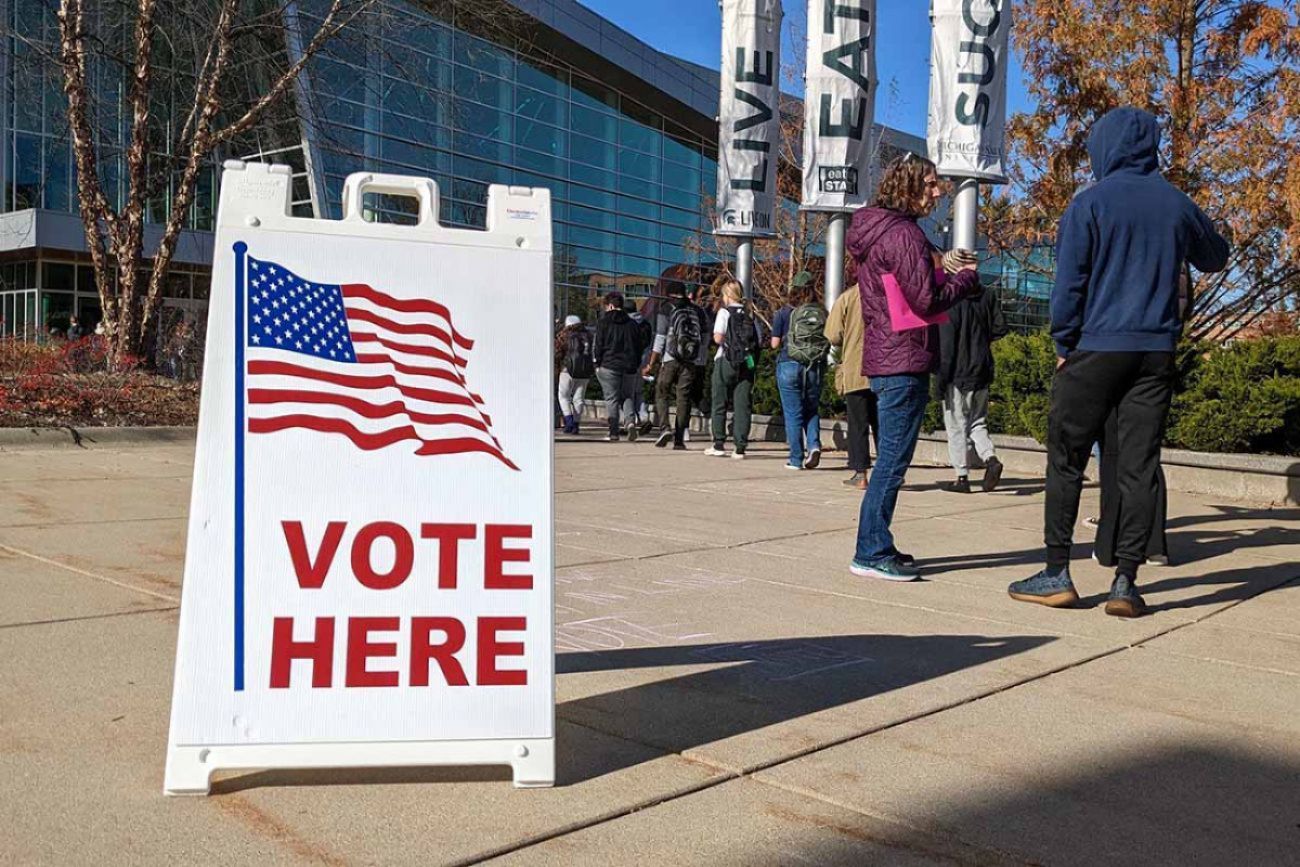Seven political plot lines to watch this year in Michigan


- Michigan voters will see an earlier presidential primary date, expanded voting options in 2024 elections
- Several competitive congressional races, U.S. Senate seat, fight for House majority among key races to watch
- In state Capitol news, split state House through April, slew of new laws taking effect in February
Happy New Year, Michigan. Are you ready for another election year?
Like it or not, there’s a ton brewing on the political front in 2024 — a wide-open U.S. Senate race, several competitive congressional seats, impending retirements of Michigan political fixtures, and of course, a presidential election.
At the state Capitol, a newly tied state House and looming legislative elections could complicate the state legislative agenda as Democrats in leadership try to push through additional priorities.
Here’s a rundown of what Michigan residents can expect this year in the state Capitol and at their ballot boxes.
New primary date
Michigan will be one of the first states to hold a presidential primary election under new rules pushed by the Democratic National Committee in 2023.
Last February, Gov. Gretchen Whitmer signed legislation to move the primary to Feb. 27 from March 12, placing Michigan voters higher in the pecking order and, in theory, increasing the state’s political clout in the crucial early stages of presidential campaigns.
Republicans opposed the move because Republican National Committee rules prohibit Michigan from holding primaries before March 1. In June, the Michigan Republican Party adopted a hybrid primary plan that would allot most of Michigan’s GOP delegates in party caucus meetings on March 2.
Incumbent Democrat Joe Biden is set to face Dean Phillips and Marianne Williamson on the Democratic primary ballot, while former President Donald Trump is up against six other presidential hopefuls in the Republican primary, including Ron DeSantis, Nikki Haley and Chris Christie.
Robert F. Kennedy Jr., who is running for president as an independent, will not be on primary ballots in Michigan.
Swing state once more
Michigan will once again be a critical step on the path to the White House for presidential hopefuls, particularly in the general election.
As in 2020, when Biden, Trump and a slew of surrogates made appearances in the Mitten, 2024 voters in key regions will likely get a chance to hear from their preferred candidate or high-profile supporters in person.
Early voting (and more)
The 2024 elections will be the first test of new election processes outlined in Proposal 2, a constitutional amendment approved by voters in 2022 to expand voting access.
Changes include requirements for at least nine days of early voting before Election Day, a statewide absentee ballot tracking system and prepaid postage for absentee ballots.
Other election-related bills approved by the Legislature, including repealing a ban on hired transportation to voting booths, are also set to take effect next year.
Open Senate, congressional seats
Three Michigan politicians aren’t seeking re-election to their U.S. House and Senate seats, setting the stage for a high-profile statewide Senate race and two open House races in politically competitive districts.
In January, U.S. Sen. Debbie Stabenow announced her pending retirement after decades serving in state and national office.
Related:
- Michigan stories to watch in 2024, from politics and schools to EVs and energy
- Michigan Dems’ big year: Sweeping new laws, no vetoes and an early end
To date, five Democrats and nine Republicans are running for the U.S. Senate seat in the 2024 election — including sitting U.S. Rep. Elissa Slotkin, whose decision to seek the Democratic Senate nomination leaves open the 7th Congressional District in mid-Michigan.
Her re-election campaign against Republican Tom Barrett in 2022 was one of the most expensive in the country. It’s shaping up to be equally competitive in 2024, with Barrett facing off against his one-time state Senate colleague Curtis Hertel, Jr.
U.S. Rep. Dan Kildee’s decision not to run again opens up another competitive race in the 8th Congressional District, which includes Genesee, Bay and Saginaw counties as well as part of Midland County.
The Flint Democrat and six-term Congressman held his own in the district even as the region grew politically more red, but Democrats only have a slim advantage there after the latest redistricting process: Hillary Clinton beat Trump there by about one percentage point in 2016, while Biden edged out Trump by two percentage points in 2020.
Other races to watch: the 10th Congressional District in Macomb County, where first-term Republican Rep. John James faces a renewed challenge from former Macomb County Judge Carl Marlinga, and the 3rd Congressional District in west Michigan, a politically competitive region currently represented by first-term Democrat Rep. Hillary Scholten.
The fight for state House majority
Democrats won a slim majority in both legislative chambers in fall 2022, helping Whitmer advance many of her biggest priorities through the Legislature.
With the House up for re-election in 2024, the pressure is on for House Democrats to hold their majority.
Expect big-money ads in several southeast Michigan districts, where incumbent Democrats and Republicans may be vulnerable. The northern Michigan district currently occupied by incumbent state Rep. Betsy Coffia, D-Traverse City, will likely also be a target for Republicans. She won her seat by just 765 votes in 2022.
A House divided
Legislative Democrats’ second year of majority control was complicated by the departure of two southeast Michigan Democrats, who by winning local races brought the House to a tie for the first time in decades.
Both seats trend Democratic, so party leaders aren’t worried about losing the majority this term. But special elections take time: the general election in those races will take place April 16, meaning the Democratic majority will need at least a little bipartisan support on any bills they hope to get to the governor’s desk.
Democrats say they’re open to working with their Republican counterparts on issues like economic development, the state budget and transparency reforms subjecting the governor and lawmakers to public records laws.
More politically controversial items on the wish list will likely have to get put on the back burner until the seats are filled — and with 2024 elections looming, the months-long tie cuts into the time Democrats have to legislate without in-district distractions.
Laws taking effect
Dozens of laws passed by the Democratic majority in 2023 take effect until Feb. 13. That’s in part because many of those new laws didn’t have enough support among Republicans to take effect immediately.
The list includes several repeals of Republican-backed policies like Right-to-Work union rules and restrictions on abortion access, as well as new gun reform laws and additional anti-discrimination protections for LGBTQ residents.
Also taking effect next year: legislation expanding the state’s Earned Income Tax Credit for lower-income workers and repealing the so-called pension tax on retirement income.
Those concepts had bipartisan support, but Senate Republicans blocked the bill from taking effect to preserve a projected income tax rate reduction.
See what new members are saying about why they donated to Bridge Michigan:
- “In order for this information to be accurate and unbiased it must be underwritten by its readers, not by special interests.” - Larry S.
- “Not many other media sources report on the topics Bridge does.” - Susan B.
- “Your journalism is outstanding and rare these days.” - Mark S.
If you want to ensure the future of nonpartisan, nonprofit Michigan journalism, please become a member today. You, too, will be asked why you donated and maybe we'll feature your quote next time!


